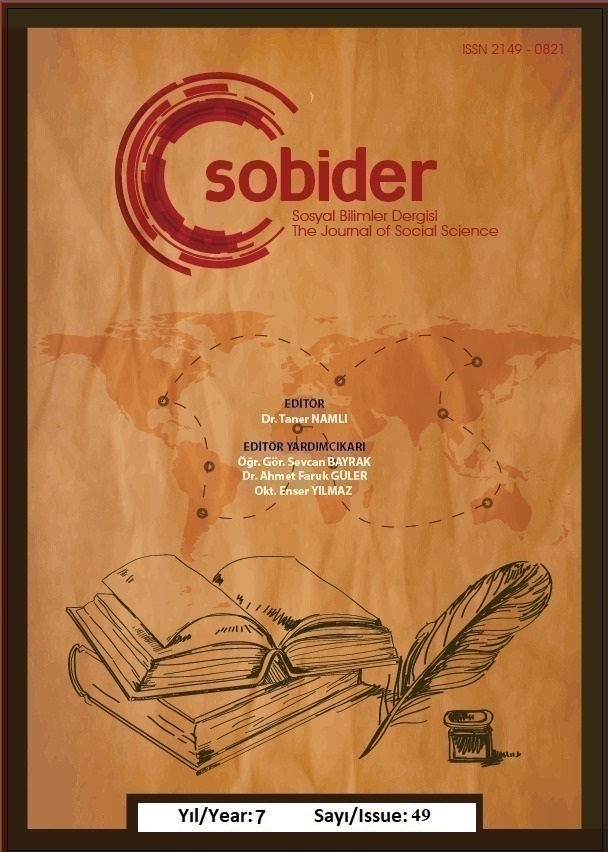Author :
Abstract
İstanbul Muhafızlığı XVII. Yüzyıldan itibaren varlığını devam ettiren askeri bir kuruluştur. Görev tanımı ve yetkileri farklı olsa da her yüzyılda önemini koruyan stratejik bir makam olmuştur. 1826 yılında Yeniçeri Ocağı’nın kaldırılması sonrası Padişah ve çevresinin korunması için en fazla güvenilen kurumların başında yer almıştır. İstanbul Muhafızlığı, II. Meşrutiyet Dönemi olarak adlandırılan 1908-1918 yılları arasında da etkinliğini sürdürmüştür. Söz konusu dönemin en etkili İstanbul Muhafızı hiç şüphesiz İttihat ve Terakki Cemiyeti’nin lider kadrosunda yer alan Cemal Bey olmuştur. Cemal Bey, Bâb-ı Ali Baskını sonrasında Mahmud Şevket Paşa tarafından 23 Ocak 1913’te İstanbul’un güvenliğinin sağlanması amacıyla ve oldukça geniş yetkilerle İstanbul Muhafızlığına tayin edilmiştir. Yaklaşık dokuz buçuk ay sürecek bu görevi sırasında, teşkilatçı ve disiplinli yapısı ve yapmış olduğu geniş kapsamlı istihbarat çalışmalarıyla Baskının rövanşını almak isteyen muhalifleri adeta kımıldayamaz hale getirmiştir. İstanbul Muhafızlığı, Sadrazam ve Harbiye Nazırı Mahmud Şevket Paşa suikastı sonrasında da alınan tedbirlerle olayların daha fazla büyümesine ve olası yeni bir darbe olayının gerçekleştirilmesine fırsat vermemiştir. Bu kritik dönemde İttihat ve Terakki Cemiyeti’nin ayakta kalmasını sağlayan bir güç odağı haline gelmiştir. Bu durum ülke içinde İstanbul Muhafızlığı’nın kuruluş gayesinden uzaklaşarak siyasallaştığı şeklinde tartışmalara neden olmuştur. Mahmut Şevket Paşa’nın şehadeti sonrasında, Harbiye Nezareti’ne getirilen Ahmet İzzet Paşa, Sadaret’e göndermiş olduğu 29 Ekim 1913 tarihli bir yazıyla, ordunun siyasetten uzak durması lüzumunu gerekçe göstererek İstanbul Muhafızlığı’nın lağvedilmesini talep etmiştir. Onun bu isteği Sadaret makamı tarafından da uygun görülmüş, ertesi gün çıkartılan İrade-i Seniyye İstanbul Muhafızlığı lağvedilmiş, Cemal Bey de İstanbul’da Birinci Kolordu Kumandan Vekilliğine tayin edilmiştir. İstanbul Muhafızlığı Mütareke sonrasında İttihat ev Terakki Hükümetlerinin lağvedilmesinden sonra yeniden tesis edilmiştir.
Keywords
Abstract
Istanbul guardship is a military organization that has survived from the 17th century. Although its job description and powers are different, it has been a strategic office that maintains its importance in every century. After the removal of the Janissaries in 1826, it became one of the most trusted institutions for the protection of the Sultan and his surroundings. Istanbul guardship, it continued its effectiveness between 1908-1918, which is called the Constitutional second Period. The most influential Istanbul guardship of the period in question was undoubtedly Djemal Bey, who was in the leading staff of the Committee of Union and Progress. Djemal Bey was appointed by Mahmud Şevket Pasha, after the 1913 Ottoman coup d’état, to the Istanbul guardship on January 23, 1913 in order to ensure the security of Istanbul and with quite extensive powers. During this mission, which will last about nine and a half months, his organizational and disciplined structure and his extensive intelligence efforts made the opponents who wanted to take the rematch of the Raid almost immobile. With the measures taken after the assassination of the Grand Vizier and the Minister of War, Mahmud Şevket Pasha, the Istanbul guardship did not allow the events to grow further and the realization of a possible new coup. In this critical period, it has become a power center that enables the Committee of Union and Progress to survive. This situation has led to discussions in the country that the Istanbul guardship has moved away from its establishment purpose and became politicized. After the martyrdom of Mahmut Şevket Pasha, Ahmet İzzet Pasha, who was brought to the Ministry of War, sent a letter dated 29 October 1913 to the Grand Vizier, citing the necessity of the army to stay away from politics and demanded the abolition of the Istanbul guardship. His request was approved by the office of the Grand Vizier, and the Irade-i Seniyye Istanbul guardship, which was issued the next day, was abolished, and Djemal Bey was appointed as the Deputy Commander of the First Corps in Istanbul. After the abolition of the Union and Progress Governments after the Armistice, the Istanbul guardship was reestablished.
Keywords
- Artuç, Nevzat. Cemal Paşa Askeri ve Siyasi Hayatı (Gözden Geçirilmiş ve Genişletilmiş İkinci Baskı), TTK, Ankara 2019.
- ___________, Türk İnkılap Tarihi, Fakülte Kitabevi, Isparta 2014.
- ____________, “Bir Siyasal Cinayet Örneği: Mahmut Şevket Paşa Suikastı”, SDÜFEFSBD, S. 12, Isparta 2005, s. 73-102.
- Ahmad, Feroz. İttihat ve Terakki (1908-1914), (Çev. Nuran Yavuz), Kaynak Yay., İstanbul Bayar, Celal. Ben de Yazdım, C. IV, Sabah Gazetesi Yay., İstanbul 1997.
- Birinci, Ali. Hürriyet ve İtilaf Fırkası, İstanbul 1990.
- Cemal Paşa, Hatıralar, (Yayına Haz. Alpay Kabacalı), Türkiye İş Bankası Yay., İstanbul 2001.
- _____________, Hatıralar, (Tamamlayan ve Tertipleyen Behçet Cemal), Selek Yay., İstanbul Duru, Kazım Nami. İttihat ve Terakki Hatıralarım, İstanbul 1957.
- Hanioğlu, M. Şükrü. “Cemal Paşa”, TDVİA, C.VII, İstanbul 1993, s. 305-307.
- İrtem, Süleyman Kâni. Meşrutiyet’ten Mütareke’ye (1908-1918),(Yayına Haz. O. Selim Kocahanoğlu), Temel Yay., İstanbul 2004.
- Kabacalı, Alpay. Türkiye’deSiyasal Cinayetler, İstanbul 1993.
- Mevlanzade Rıfat. İttihat ve Terakki İktidarı ve Türkiye İnkılabının İç Yüzü, (yayına Haz. Ahmet Nezih Galitekin), İstanbul 1993.
- “Müstahfız”, mad.,TDVİA, C. 32, İstanbul 2006, s. 109-111.
- Özcan, Abdülkadir. “Zaptiye”, mad.,TDVİA, C.44, İstanbul 2013, s. 128-130.
- _________________, “Karakol”, mad.,TDVİA, C.24, İstanbul 2001, s. 430-431.
- Remond, Georges. Mağluplarla Beraber, (Osmanlıcaya Çev: Hasan Cevdet), (Yayına Haz. Muammer Sarıkaya), Profil Yay., İstanbul 2007.
- SIR, İhsan Nuri. “Cemal Paşa İstanbulMuhafızlığı’ndan Nasıl İstifa Etmişti?”, Tarih Dünyası, C. II, S. 17, 15 Aralık 1950, s. 719.
- Tunaya, T. Zafer. Türkiye’de Siyasal Partiler, C. III, İletişim Yay., İstanbul 2000. Ünal, M. Ali.,Osmanlı Tarih Sözlüğü, Paradigma Yay., İstanbul 2011
- Yahya Kemal, Siyasi ve Edebi Portreler, İstanbul 1986.
- Yalçın, H. Cahit.,Siyasal Anılar, (Yayına Haz. Rauf Mutluay), Türkiye İş Bankası Kültür Yay., İstanbul 2000.
